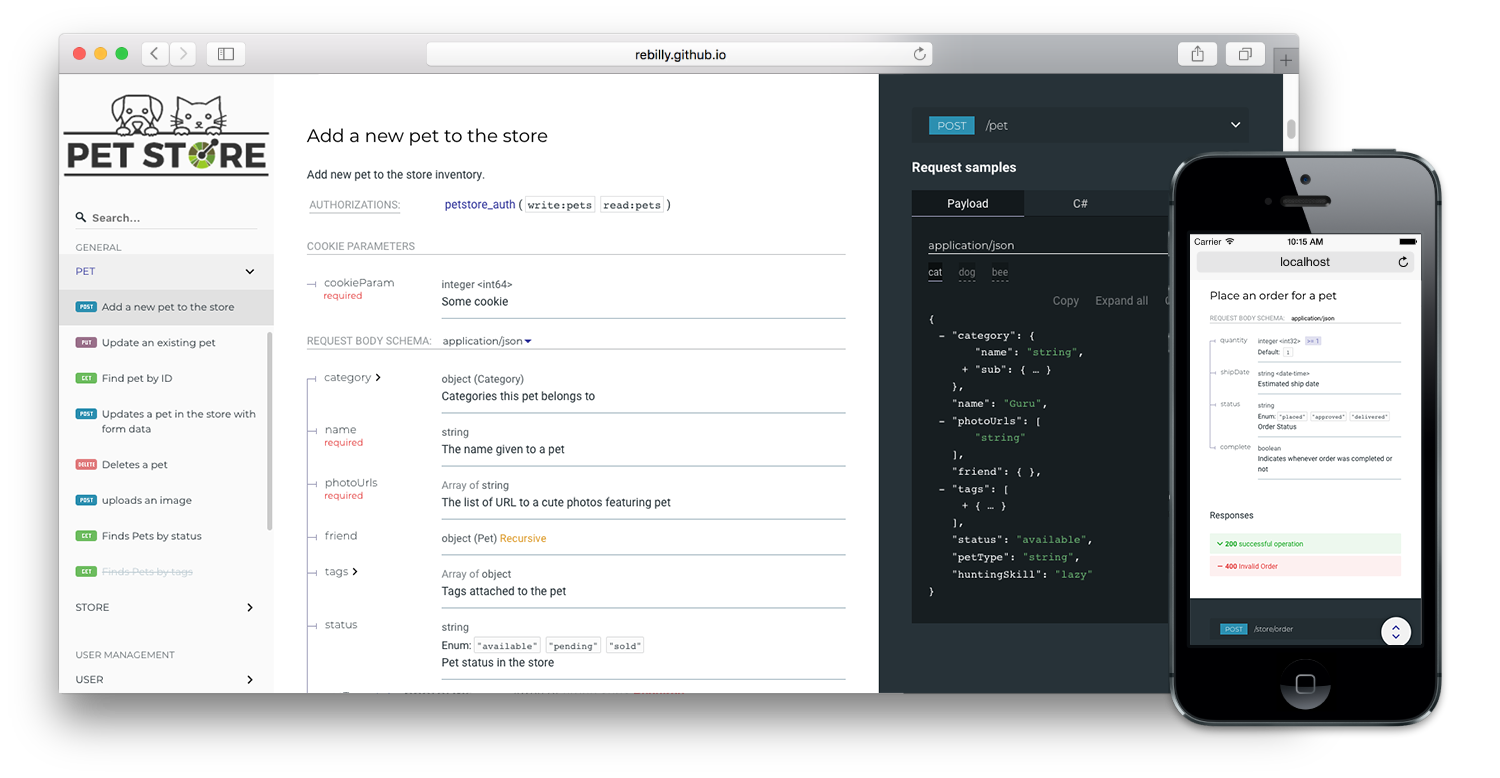AI prompts
base on 📘 OpenAPI/Swagger-generated API Reference Documentation <div align="center">
<img alt="Redoc logo" src="https://raw.githubusercontent.com/Redocly/redoc/main//docs/images/redoc.png" width="400px" />
# Generate beautiful API documentation from OpenAPI
[](https://www.npmjs.com/package/redoc) [](https://github.com/Redocly/redoc/blob/main/LICENSE)
[](https://cdn.redoc.ly/redoc/latest/bundles/redoc.standalone.js) [](https://www.npmjs.com/package/redoc) [](https://www.jsdelivr.com/package/npm/redoc)
</div>
## About Redoc
Redoc is an open source tool for generating documentation from OpenAPI (formerly Swagger) definitions.
By default Redoc offers a three-panel, responsive layout:
- The left panel contains a search bar and navigation menu.
- The central panel contains the documentation.
- The right panel contains request and response examples.

## Live demo
If you want to see how Redoc renders your OpenAPI definition,
you can try it out online at https://redocly.github.io/redoc/.
A version of the Swagger Petstore API is displayed by default.
To test it with your own OpenAPI definition,
enter the URL for your definition and select **TRY IT**.
## Redoc features
- Responsive three-panel design with menu/scrolling synchronization
- Support for OpenAPI 3.1, OpenAPI 3.0, and Swagger 2.0
- Ability to integrate your API introduction into the side menu
- High-level grouping in side menu with the [`x-tagGroups`](https://redocly.com/docs/api-reference-docs/specification-extensions/x-tag-groups/) specification extension
- [Simple integration with `create-react-app`](https://redocly.com/docs/redoc/quickstart/react/)
- Code samples support (with vendor extension) <br>

## Usage
Redoc is provided as a CLI tool (also distributed as a Docker image), HTML tag, and React component.
### Generate documentation from the CLI
If you have Node installed, quickly generate documentation using `npx`:
```bash
npx @redocly/cli build-docs openapi.yaml
```
The tool outputs by default to a file named `redoc-static.html` that you can open in your browser.
> [Redocly CLI](https://github.com/Redocly/redocly-cli/) does more than docs; check it out and add linting, bundling, and more to your API workflow.
### Add an HTML element to the page
Create an HTML page, or edit an existing one, and add the following within the body tags:
```html
<redoc spec-url="http://petstore.swagger.io/v2/swagger.json"></redoc>
<script src="https://cdn.redoc.ly/redoc/latest/bundles/redoc.standalone.js"> </script>
```
Open the HTML file in your browser, and your API documentation is shown on the page.
Add your own `spec-url` to the `<redoc>` tag; this attribute can also be a local file. The JavaScript library can also be installed locally using `npm` and served from your own server, see the [HTML deployment documentation](https://redocly.com/docs/redoc/deployment/html/) for more details.
### More usage options
Check out the [deployment documentation](./docs/deployment/intro.md) for more options, and detailed documentation for each.
## Redoc vs. Redocly API Reference
Redoc is Redocly's community-edition product. Looking for something more?
We also offer [hosted API reference documentation](https://redocly.com/docs/api-registry/guides/api-registry-quickstart/)
with additional features including:
* Try-it console
* Automated code samples
* Pagination
* Extra theme options
### Documentation and resources
- [Reference docs](https://redocly.com/docs/api-reference-docs/getting-started/) - we take care of the hosting
- [Redoc](https://redocly.com/docs/redoc/) - detailed documentation for this open source project (also in the `docs/` folder)
- [Command-line interface to bundle your docs into a web-ready HTML file](https://redocly.com/docs/cli/commands/build-docs/)
- API linting, bundling, and much more with open source [Redocly CLI](https://redocly.com/docs/cli)
## Showcase
A sample of the organizations using Redocly tools in the wild:
- [Rebilly](https://api-reference.rebilly.com/)
- [Docker Engine](https://docs.docker.com/engine/api/v1.25/)
- [Zuora](https://www.zuora.com/developer/api-reference/)
- [Discourse](http://docs.discourse.org)
- [Commbox](https://www.commbox.io/api/)
- [APIs.guru](https://apis.guru/api-doc/)
- [BoxKnight](https://www.docs.boxknight.com/)
- [Quaderno API](https://developers.quaderno.io/api)
_Pull requests to add your own API page to the list are welcome_
## Configuration
Redoc is highly configurable, see the [configuration documentation](docs/config.md) for details.
### OpenAPI specification extensions
Redoc uses the following [specification extensions](https://redocly.com/docs/api-reference-docs/spec-extensions/):
* [`x-logo`](docs/redoc-vendor-extensions.md#x-logo) - is used to specify API logo
* [`x-traitTag`](docs/redoc-vendor-extensions.md#x-traitTag) - useful for tags that refer to non-navigation properties like Pagination, Rate-Limits, etc
* [`x-codeSamples`](docs/redoc-vendor-extensions.md#x-codeSamples) - specify operation code samples
* [`x-badges`](docs/redoc-vendor-extensions.md#x-badges) - specify operation badges
* [`x-examples`](docs/redoc-vendor-extensions.md#x-examples) - specify JSON example for requests
* [`x-nullable`](docs/redoc-vendor-extensions.md#x-nullable) - mark schema param as a nullable
* [`x-displayName`](docs/redoc-vendor-extensions.md#x-displayname) - specify human-friendly names for the menu categories
* [`x-tagGroups`](docs/redoc-vendor-extensions.md#x-tagGroups) - group tags by categories in the side menu
* [`x-servers`](docs/redoc-vendor-extensions.md#x-servers) - ability to specify different servers for API (backported from OpenAPI 3.0)
* [`x-additionalPropertiesName`](docs/redoc-vendor-extensions.md#x-additionalPropertiesName) - ability to supply a descriptive name for the additional property keys
* [`x-summary`](docs/redoc-vendor-extensions.md#x-summary) - for Response object, use as the response button text, with description rendered under the button
* [`x-explicitMappingOnly`](docs/redoc-vendor-extensions.md#x-explicitMappingOnly) - in Schemas, display a more descriptive property name in objects with additionalProperties when viewing the property list with an object
## Releases
**The README for the `1.x` version is on the [v1.x](https://github.com/Redocly/redoc/tree/v1.x) branch.**
All the 2.x releases are deployed to npm and can be used with Redocly-cdn:
- particular release, for example, `v2.0.0`: https://cdn.redoc.ly/redoc/v2.0.0/bundles/redoc.standalone.js
- `latest` release: https://cdn.redoc.ly/redoc/latest/bundles/redoc.standalone.js
Additionally, all the 1.x releases are hosted on our GitHub Pages-based CDN **(deprecated)**:
- particular release, for example `v1.2.0`: https://rebilly.github.io/ReDoc/releases/v1.2.0/redoc.min.js
- `v1.x.x` release: https://rebilly.github.io/ReDoc/releases/v1.x.x/redoc.min.js
- `latest` release: https://rebilly.github.io/ReDoc/releases/latest/redoc.min.js - points to latest 1.x.x release since 2.x releases are not hosted on this CDN but on unpkg.
## Development
see [CONTRIBUTING.md](.github/CONTRIBUTING.md)
", Assign "at most 3 tags" to the expected json: {"id":"4054","tags":[]} "only from the tags list I provide: [{"id":77,"name":"3d"},{"id":89,"name":"agent"},{"id":17,"name":"ai"},{"id":54,"name":"algorithm"},{"id":24,"name":"api"},{"id":44,"name":"authentication"},{"id":3,"name":"aws"},{"id":27,"name":"backend"},{"id":60,"name":"benchmark"},{"id":72,"name":"best-practices"},{"id":39,"name":"bitcoin"},{"id":37,"name":"blockchain"},{"id":1,"name":"blog"},{"id":45,"name":"bundler"},{"id":58,"name":"cache"},{"id":21,"name":"chat"},{"id":49,"name":"cicd"},{"id":4,"name":"cli"},{"id":64,"name":"cloud-native"},{"id":48,"name":"cms"},{"id":61,"name":"compiler"},{"id":68,"name":"containerization"},{"id":92,"name":"crm"},{"id":34,"name":"data"},{"id":47,"name":"database"},{"id":8,"name":"declarative-gui "},{"id":9,"name":"deploy-tool"},{"id":53,"name":"desktop-app"},{"id":6,"name":"dev-exp-lib"},{"id":59,"name":"dev-tool"},{"id":13,"name":"ecommerce"},{"id":26,"name":"editor"},{"id":66,"name":"emulator"},{"id":62,"name":"filesystem"},{"id":80,"name":"finance"},{"id":15,"name":"firmware"},{"id":73,"name":"for-fun"},{"id":2,"name":"framework"},{"id":11,"name":"frontend"},{"id":22,"name":"game"},{"id":81,"name":"game-engine "},{"id":23,"name":"graphql"},{"id":84,"name":"gui"},{"id":91,"name":"http"},{"id":5,"name":"http-client"},{"id":51,"name":"iac"},{"id":30,"name":"ide"},{"id":78,"name":"iot"},{"id":40,"name":"json"},{"id":83,"name":"julian"},{"id":38,"name":"k8s"},{"id":31,"name":"language"},{"id":10,"name":"learning-resource"},{"id":33,"name":"lib"},{"id":41,"name":"linter"},{"id":28,"name":"lms"},{"id":16,"name":"logging"},{"id":76,"name":"low-code"},{"id":90,"name":"message-queue"},{"id":42,"name":"mobile-app"},{"id":18,"name":"monitoring"},{"id":36,"name":"networking"},{"id":7,"name":"node-version"},{"id":55,"name":"nosql"},{"id":57,"name":"observability"},{"id":46,"name":"orm"},{"id":52,"name":"os"},{"id":14,"name":"parser"},{"id":74,"name":"react"},{"id":82,"name":"real-time"},{"id":56,"name":"robot"},{"id":65,"name":"runtime"},{"id":32,"name":"sdk"},{"id":71,"name":"search"},{"id":63,"name":"secrets"},{"id":25,"name":"security"},{"id":85,"name":"server"},{"id":86,"name":"serverless"},{"id":70,"name":"storage"},{"id":75,"name":"system-design"},{"id":79,"name":"terminal"},{"id":29,"name":"testing"},{"id":12,"name":"ui"},{"id":50,"name":"ux"},{"id":88,"name":"video"},{"id":20,"name":"web-app"},{"id":35,"name":"web-server"},{"id":43,"name":"webassembly"},{"id":69,"name":"workflow"},{"id":87,"name":"yaml"}]" returns me the "expected json"